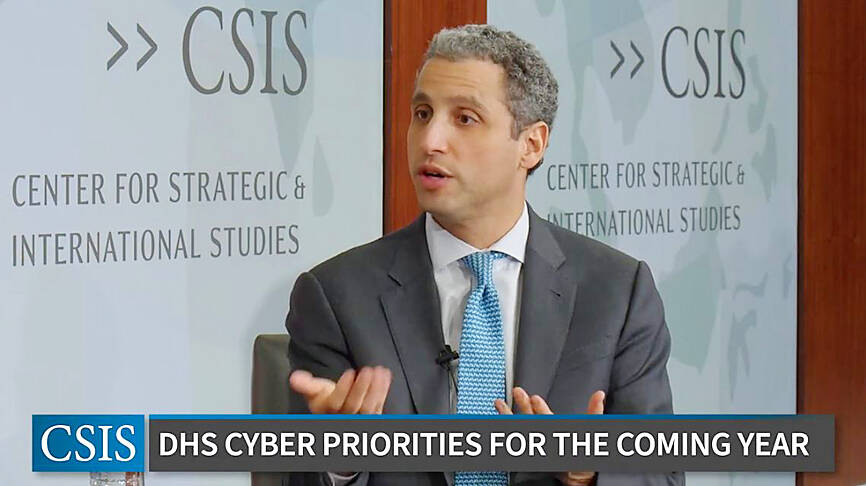US Undersecretary of Homeland Security for Strategy, Policy and Plans Robert Silvers on Friday warned of the risks that using Chinese telecommunications equipment could have on global infrastructure.
At an event hosted by the Washington-based Center for Strategic and International Studies think tank on the topic of cybersecurity, Silvers said he and other US officials were urging other countries to avoid using Chinese telecommunications equipment, to prevent introducing information security risks.
“It may be that the Chinese-controlled technology is the cheapest available, but it may also be that that’s not the final bill to arrive,” he said. “What happens five years, 10 years down the road when the government of the People’s Republic of Society has the ability to pull the rug out from under your entire society?”

Photo: Screen grab from a Center for Strategic and International Studies video
Separately, Mark Montgomery, senior director of the Foundation for the Defense of Democracies’ Center on Cyber and Technology Innovation, was quoted by Voice of America’s Chinese-language Web site on Saturday as saying that the US Department of Defense should assist Taiwan in dealing with cybersecurity challenges.
China would not likely attempt a military landing on Taiwan, but would instead engage in cyberattacks against Taiwan’s key infrastructure, including its power grid, water supply and other systems, he was quoted as saying.
China might also try to use cybertools to destroy Taiwan’s satellite communications, he added.
US assistance would involve researching critical infrastructure, finding vulnerabilities and devising ways to protect against them, he said.
Montgomery was one of the primary authors of a report the foundation published on Friday titled The Attack on America’s Future: Cyber-Enabled Economic Warfare.
The report said the US must work with allies to defend against cyberattacks by aggressive nations.
“Cyberattacks on critical infrastructure could disrupt a U.S. military mobilization in defense of Taiwan or interfere with other military operations by China’s adversaries,” the report said, citing information from James Mulvenon’s book The People’s Liberation Army in the Information Age.
The report said China aims to take control of global information and communications infrastructure.
“Altogether, China has implemented a coherent long-term strategy to control key nodes in the global economy and communications infrastructure — all at the expense of the United States and its allies,” the report said.
Ultimately, China’s aim is to “alter global dynamics to promote its interests while diminishing the influence of the United States and other free-market democracies,” it said, citing Vijay Gokhale’s Foreign Policy article “China is Gnawing at Democracy’s Roots Worldwide”.

A magnitude 7.0 earthquake struck off Yilan at 11:05pm yesterday, the Central Weather Administration (CWA) said. The epicenter was located at sea, about 32.3km east of Yilan County Hall, at a depth of 72.8km, CWA data showed There were no immediate reports of damage. The intensity of the quake, which gauges the actual effect of a seismic event, measured 4 in Yilan County area on Taiwan’s seven-tier intensity scale, the data showed. It measured 4 in other parts of eastern, northern and central Taiwan as well as Tainan, and 3 in Kaohsiung and Pingtung County, and 2 in Lienchiang and Penghu counties and 1

A car bomb killed a senior Russian general in southern Moscow yesterday morning, the latest high-profile army figure to be blown up in a blast that came just hours after Russian and Ukrainian delegates held separate talks in Miami on a plan to end the war. Kyiv has not commented on the incident, but Russian investigators said they were probing whether the blast was “linked” to “Ukrainian special forces.” The attack was similar to other assassinations of generals and pro-war figures that have either been claimed, or are widely believed to have been orchestrated, by Ukraine. Russian Lieutenant General Fanil Sarvarov, 56, head

‘POLITICAL GAME’: DPP lawmakers said the motion would not meet the legislative threshold needed, and accused the KMT and the TPP of trivializing the Constitution The Legislative Yuan yesterday approved a motion to initiate impeachment proceedings against President William Lai (賴清德), saying he had undermined Taiwan’s constitutional order and democracy. The motion was approved 61-50 by lawmakers from the main opposition Chinese Nationalist Party (KMT) and the smaller Taiwan People’s Party (TPP), who together hold a legislative majority. Under the motion, a roll call vote for impeachment would be held on May 19 next year, after various hearings are held and Lai is given the chance to defend himself. The move came after Lai on Monday last week did not promulgate an amendment passed by the legislature that

FOREIGN INTERFERENCE: Beijing would likely intensify public opinion warfare in next year’s local elections to prevent Lai from getting re-elected, the ‘Yomiuri Shimbun’ said Internal documents from a Chinese artificial intelligence (AI) company indicated that China has been using the technology to intervene in foreign elections, including propaganda targeting Taiwan’s local elections next year and presidential elections in 2028, a Japanese newspaper reported yesterday. The Institute of National Security of Vanderbilt University obtained nearly 400 pages of documents from GoLaxy, a company with ties to the Chinese government, and found evidence that it had apparently deployed sophisticated, AI-driven propaganda campaigns in Hong Kong and Taiwan to shape public opinion, the Yomiuri Shimbun reported. GoLaxy provides insights, situation analysis and public opinion-shaping technology by conducting network surveillance